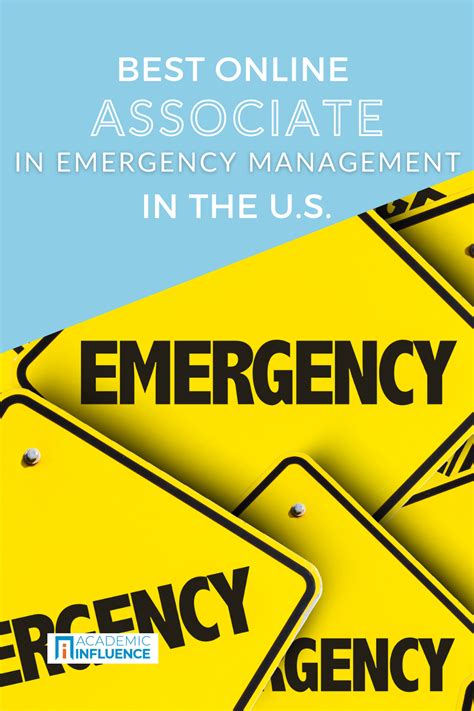Pursuing an online degree in emergency management offers a convenient and flexible path to advance your career in a field that is in high demand. Whether you're a seasoned professional seeking to enhance your skills or a newcomer eager to enter this critical sector, obtaining an online degree can provide the knowledge and credentials you need to excel. With various types of programs available, choosing the right one for your goals and schedule requires careful consideration.
Types of Online Emergency Management Degrees
Online emergency management degrees prepare individuals for leadership roles in disaster preparedness, response, and recovery. These programs offer a variety of specializations, including:
- Emergency Management and Homeland Security: Focuses on the principles of emergency management, terrorism prevention, and disaster risk reduction.
- Disaster Preparedness and Response: Prepares students to develop and implement plans for disaster preparedness and response in various settings.
- Emergency Management and Public Health: Combines emergency management principles with public health practices to address health-related emergencies.
- Emergency Management and Nonprofit Administration: Provides a foundation in nonprofit management and leadership, with a focus on emergency response and recovery.
- Emergency Management and Climate Change: Explores the impacts of climate change on emergency management and develops strategies for adaptation and mitigation.

Choosing the Right Online Program
Selecting the right online emergency management program is crucial. Consider factors such as:
- Program Accreditation: Ensure the program is accredited by a recognized accrediting body, such as FEMA's Emergency Management Institute or the National Association of Emergency Managers (NAEM).
- Faculty Experience: Seek programs with faculty who have real-world experience in emergency management and can provide valuable insights.
- Course Structure: Determine if the program offers synchronous or asynchronous courses, and whether they fit your schedule and learning style.
- Technology Requirements: Ensure you have the necessary technology and internet access to participate effectively in the online program.
- Cost and Financial Aid: Compare program costs and explore potential financial aid options, such as scholarships and tuition assistance.
Admissions Requirements and Application Process
Admissions requirements vary depending on the program, but typically include:
- Bachelor's Degree: Most programs require a bachelor's degree in any field.
- Minimum GPA: Programs may set minimum GPA requirements for admission.
- Work Experience: Some programs prefer candidates with relevant work experience in emergency management or related fields.
- Personal Statement or Essay: Applicants may be required to submit a personal statement or essay describing their interest in emergency management and career goals.
- Letters of Recommendation: Letters of recommendation from professionals in the field may be required.
Curriculum and Coursework
Online emergency management degrees typically cover the following core areas:
- Disaster Preparedness and Response: Principles of disaster preparedness, planning, and response.
- Emergency Management Policy and Law: Legal and policy frameworks for emergency management.
- Hazard Mitigation and Risk Assessment: Techniques for identifying, assessing, and mitigating hazards.
- Disaster Recovery and Resilience: Strategies for disaster recovery and building community resilience.
- Crisis Communication and Public Relations: Managing public information during emergencies.
Online Learning Platforms and Technology
Online learning platforms provide the infrastructure for virtual classes and coursework. Programs may use platforms such as:
- Learning Management Systems (LMS): Blackboard, Canvas, or Moodle.
- Video Conferencing Tools: Zoom, Microsoft Teams, or Google Meet.
- Virtual Simulations: Virtual reality or game-based simulations for immersive learning experiences.
- Discussion Forums: Online platforms for asynchronous discussions and collaboration.
- Cloud-Based Technologies: Cloud platforms for document sharing, collaboration, and data storage.
Faculty and Support Services
Strong faculty and support services are essential for online learning. Look for programs that offer:
- Experienced Faculty: Faculty with extensive experience in emergency management and research.
- Technical Support: Dedicated technical support to assist with any technological challenges.
- Virtual Office Hours: Opportunities to interact with faculty and peers during scheduled virtual office hours.
- Mentoring and Advising: Access to mentors and academic advisors to guide students through the program.
- Career Services: Career counseling, job placement assistance, and networking opportunities.
Career Outlook and Job Opportunities
Graduates with online emergency management degrees are in high demand in various sectors:
- Government Agencies: FEMA, Department of Homeland Security, and state and local emergency management agencies.
- Nonprofit Organizations: Red Cross, Salvation Army, and other organizations involved in disaster relief and recovery.
- Private Sector: Emergency preparedness and response consultants, risk management specialists, and corporate security professionals.
- International Organizations: United Nations, Red Cross International, and other humanitarian aid agencies.
- Academic Institutions: Teaching and research positions in emergency management programs.
Benefits of Earning an Online Emergency Management Degree
Online emergency management degrees offer numerous benefits:
- Flexibility: Online programs provide flexibility to study at your own pace and schedule.
- Accessibility: They allow students from diverse backgrounds and locations to access quality education.
- Career Advancement: Degrees enhance career prospects and open doors to leadership positions.
- Networking Opportunities: Online programs facilitate connections with peers and professionals in the field.
- Lifelong Learning: They provide opportunities for continuous professional development and staying up-to-date with industry best practices.
Costs and Financial Aid Options
The cost of online emergency management degrees varies depending on the program and institution. Explore financial aid options such as:
- Scholarships: Merit-based or need-based scholarships offered by universities, organizations, or government agencies.
- Tuition Assistance: Employers may provide tuition assistance programs for employees pursuing higher education.
- Student Loans: Federal student loans or private loans can help cover educational expenses.
- Grants: Government or private grants may be available to students with financial need.
- Military Benefits: Active military members, veterans, and their dependents may be eligible for reduced tuition or other financial assistance.
Accreditation and Quality Considerations
Accreditation ensures that online emergency management programs meet quality standards. Look for programs accredited by organizations such as:
- FEMA's Emergency Management Institute: Offers the Emergency Management Professional (EMP) certification.
- National Association of Emergency Managers (NAEM): Provides accreditation for undergraduate and graduate programs.
- International Association of Emergency Managers (IAEM): Offers the Certified Emergency Manager (CEM) certification.
- National Emergency Management Association (NEMA): Provides accreditation for emergency management agencies.
Future Trends and Innovations in Emergency Management Education
The field of emergency management is constantly evolving, and online education is adapting to meet these changes:
- Virtual Reality (VR) and Augmented Reality (AR): VR and AR technologies are being used to provide immersive learning experiences in emergency preparedness and response.
- Artificial Intelligence (AI): AI algorithms are being developed to assist emergency managers in disaster prediction, resource allocation, and decision-making.
- Blockchain Technology: Blockchain technology is being explored for secure data management and resource tracking in emergency management.
- Adaptive and Personalized Learning: Online programs are becoming more adaptive, providing customized learning paths based on individual student needs.
- Micro-Credentials and Stackable Certificates: Emergency management professionals can earn micro-credentials or stackable certificates to enhance their knowledge and skills without committing to a full degree program.
Conclusion
Online degrees in emergency management offer a convenient and flexible way to advance your career in this critical field. By carefully considering the factors discussed in this guide, you can make an informed decision about the right program for your needs. Start your journey today and make a positive impact on disaster preparedness and response.
Closing Word
Remember that the information provided in this article is for general guidance purposes only. It is recommended to contact individual institutions and programs for the most up-to-date and specific information.



